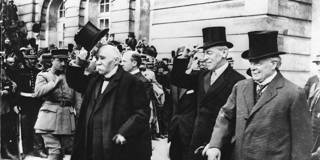The agreement that ended World War I, signed in June 1919, imposed a ruinous debt burden on Germany. A century later, Germany has assumed the role of the eurozone’s self-righteous creditor, fretting about “moral hazard” and ignoring the destabilizing, contagious effects of making debtor countries poorer.
LONDON – This month marks the centenary of the Treaty of Versailles, one of the agreements that brought World War I to a close. In a sense, the tables have turned. Whereas the treaty imposed huge reparations on Germany, today’s Germany has taken the lead in imposing a large debt obligation on its fellow eurozone member Greece.
Although the creditor-debtor cards have been reshuffled since 1919, the game remains the same. Creditors want their pound of flesh, and debtors want to avoid giving it. Debtors want their debts forgiven, while creditors fret about “moral hazard” and ignore the destabilizing, contagious effects of making debtor countries poorer. Sadly, the eurozone has not learned the debt lessons of Versailles, or heeded the warnings of John Maynard Keynes.
When World War I ended, the victorious allies were determined that Germany should make “reparation” for the damage it had caused in the war, partly to pay off the debts they owed one another. But they failed to agree at Versailles on a final figure for the indemnity, instead tasking a Reparations Commission to determine the amount by 1921.

LONDON – This month marks the centenary of the Treaty of Versailles, one of the agreements that brought World War I to a close. In a sense, the tables have turned. Whereas the treaty imposed huge reparations on Germany, today’s Germany has taken the lead in imposing a large debt obligation on its fellow eurozone member Greece.
Although the creditor-debtor cards have been reshuffled since 1919, the game remains the same. Creditors want their pound of flesh, and debtors want to avoid giving it. Debtors want their debts forgiven, while creditors fret about “moral hazard” and ignore the destabilizing, contagious effects of making debtor countries poorer. Sadly, the eurozone has not learned the debt lessons of Versailles, or heeded the warnings of John Maynard Keynes.
When World War I ended, the victorious allies were determined that Germany should make “reparation” for the damage it had caused in the war, partly to pay off the debts they owed one another. But they failed to agree at Versailles on a final figure for the indemnity, instead tasking a Reparations Commission to determine the amount by 1921.